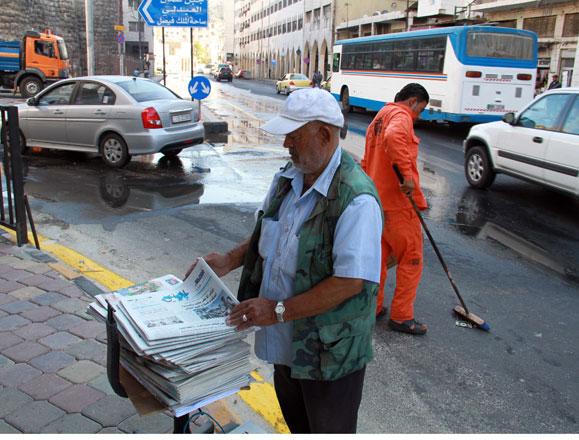You are here
Print media in Jordan will not die soon, with some wisdom — experts
By Omar Obeidat - Mar 23,2016 - Last updated at Mar 23,2016

A street vendor prepares newspapers in downtown Amman in this recent photo (photo by Osama Aqarbeh)
AMMAN – The “fittest” daily newspapers in Jordan are likely to survive for at least a decade, because readers still prefer to consume content via print, experts in the industry said Wednesday.
In interviews with The Jordan Times, the pundits said that the steady rise of digital technology as the adoption of smartphones in the Kingdom, is not to blame for the current financial crises facing some newspapers as most of the troubles are related to "unsound management” over the past few years.
They agreed that the future of the industry will be for the electronic model as most newspapers will take the digital form but will continue to print.
In Jordan, there are seven daily newspapers, according to the Jordan Press Association. In 2015, Al Arab Al Yawm that used to employ around 120 journalists and workers closed down, succumbing to its financial crisis.
Al Rai, Jordan's largest newspaper, has been incurring financial losses of about JD2 million a year in recent years, while the Kingdom's oldest daily Ad-Dustour is heavily indebted and was forced to reduce of its staff members from around 500 employees to only 170 due to continued losses.
Jordan Media Institute Dean Basim Tweissi said the difficulties facing print media in Jordan are not similar to those the international newspapers are struggling with, as the main reasons that caused their current decline in revenues have to do with self-made mistakes related to poor management and bad governance.
"We have to ask about the way dailies have been managed over the past years," he said, adding that in order to survive newspapers have to invest in their websites.
For the coming years, Tweisi expected some newspapers to go out of business, but new print outlets may emerge.
Jawad Anani, chairman of Ad-Dustour daily, agreed that print media will not disappear soon in Jordan as people still prefer paper over phones and tablets, but stressed that the industry has to improve the content and also has to redefine its products by investing in online versions and should launch their radio stations to generate higher revenues.
“When the cinema was invented people said theatres would be doomed, and when the television was invented, they said the cinema would die,” Anani said, adding that some newspapers in Jordan will “of course” fall during the coming decade because they will not be able to survive the competition.
Commenting on the recent decision by prominent Lebanese newspapers As-Safir and An-Nahar to stop printing and go online only, Anani said that there are a large number of dailies in Lebanon, adding that most of them have usually relied on funding from outside the country, but things have changed in that regard.
Ramadan Rawashdeh, chairman of the Jordan Press Foundation (JPF) that publishes Al Rai and The Jordan Times said the reason for the deteriorating financial conditions of newspapers is mainly because of administrative mistakes by managements over the past years.
“For example, Al Rai’s financial troubles today are related to unfeasible projects by previous administrations,” he said, citing the commercial print press project that cost the foundation over JD40 million.
“Some newspapers will close down in the coming years because they will not be able to come up with revenue-generating investments,” Rawashdeh said, adding other newspapers will continue to print and make profits as Jordanian readers still prefer paper.
However, the JPF chairman said dailies should work more on their digital versions because it is the future, indicating plans to launch a new website for Al Rai and also to start a news channel to reach a larger audience and generate higher revenues from ads.
Issam Al Mousa, a professor of media at Philadelphia University, said a declining demand for newspapers is already a fact, adding that only the fittest newspapers will survive.
“I don’t believe that print media will disappear in Jordan or the world anytime soon,” Mousa said, adding that he expects at least three newspapers to continue to exist in the local scene this decade.
“There are some newspapers that are deep-rooted in the Jordanian society,” he said, adding that older generation will remain loyal to paper editions for long years to come.
Mousa said that print media in Jordan can still make more revenues from ads than online, adding even if some dailies decide to go online only, ads will not be enough to keep it going.
Related Articles
Sector leaders on Sunday said the government's decision to increase advertisement rates it pays to newspapers and temporarily exempt their production input from customs duties will partially alleviate the financial difficulties facing print media, but more efforts are needed.
Al Rai editorial team on Monday decided to boycott news related to Prime Minister Abdullah Ensour’s government for the second consecutive day to pressure decision makers to meet employees' demands.
AMMAN — Al Rai Arabic daily has launched a new interactive website as it seeks to boost its online presence. The website, which was opt














